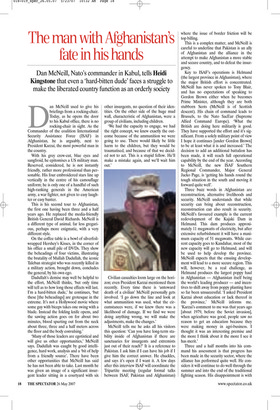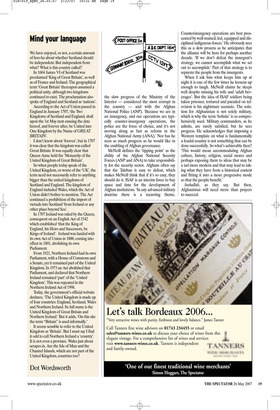The man with Afghanistan’s fate in his hands
Dan McNeill, Nato’s commander in Kabul, tells Heidi Kingstone that even a ‘hard-bitten dude’ faces a struggle to make the liberated country function as an orderly society Dan McNeill used to give his briefings from a rocking-chair. Today, as he opens the door to his Kabul office, there is no rocking-chair in sight. As the Commander of the coalition International Security Assistance Force (ISAF) in Afghanistan, he is arguably, next to President Karzai, the most powerful man in the country.
With his grey crew-cut, blue eyes and sangfroid, he epitomises a US military man. Reserved, considered, he is not instantly friendly, rather more professional than personable. His four embroidered stars line up vertically in the centre of his camouflage uniform; he is only one of a handful of such high-ranking generals in the American army, a war fighter, not given to easy laughter or easy banter.
This is his second tour to Afghanistan, the first one having been three and a half years ago. He replaced the media-friendly British General David Richards. McNeill is a different type of animal, far less gregarious, perhaps more enigmatic, with a very different style.
On the coffee table is a bowl of silverfoilwrapped Hershey’s Kisses, in the corner of his office a small pile of DVDs. They show the beheadings of four victims, illustrating the brutality of Mullah Dadullah, the iconic Taleban strategist who was recently killed in a military action, brought down, concludes the general, by his own ego.
Dadullah’s demise may well be helpful to the effort, McNeill thinks, ‘but only time will tell as to how long those effects will last. I’m a hard-bitten dude,’ he continues, ‘but these [the beheadings] are grotesque in the extreme. It’s not a Hollywood movie where some guy with biceps takes one swing with a blade. Instead the folding knife opens, and the sawing action goes on for about two minutes, blood spurting out from the neck about three, three and a half meters across the floor and the body convulsing.’ ‘Many of those leaders are egotistical and will give us other opportunities,’ McNeill says. Dadullah was caught by good intelligence, hard work, analysis and a ‘bit of help from a friendly source’. There have been other opportunities that McNeill has said he has not been able to take. Last month he was given an image of a significant insurgent leader sitting in a courtyard with six other insurgents, no question of their identities. On the other side of the huge mud wall, characteristic of Afghanistan, were a group of civilians, including children.
‘We had the capacity to engage, we had the right concept, we knew exactly the outcome because of the ammunition we were going to use. There would likely be little harm to the children, but they would be traumatised, and because of that we decided not to act. This is a stupid fellow. He’ll make a mistake again, and we’ll wait him out.’ Civilian casualties loom large on the horizon; even President Karzai mentioned them recently. Every time there is ‘untoward death of a civilian’ McNeill personally gets involved. ‘I go down the line and look at what ammunition was used, what the circumstances were, if we knew there was a likelihood of damage. If we find we were doing anything wrong, we will make the adjustments, make the changes.’ McNeill tells me he asks all his visitors this question: ‘Can you have long-term stability inside of Afghanistan if there are sanctuaries for insurgents and extremists just out of their reach?’ It is a reference to Pakistan. I ask him if I can have his job if I give him the correct answer. He chuckles, and says it’s open if I want it. A few days after this interview ISAF will coordinate the Tripartite meeting (regular formal talks between ISAF, Pakistan and Afghanistan) where the issue of border friction will be top billing.
This is a complex matter, and McNeill is careful to underline that Pakistan is an ally of Afghanistan and the alliance in the attempt to make Afghanistan a more stable and secure country, and to defeat the insurgency.
Key to ISAF’s operations is Helmand (the largest province in Afghanistan), where the major British effort is concentrated. McNeill has never spoken to Tony Blair, and has no expectations of speaking to Gordon Brown either when he becomes Prime Minister, although they are both stubborn Scots (McNeill is of Scottish descent). His chain of command leads to Brussels, to the Nato SacEur (Supreme Allied Command Europe). ‘What the British are doing here militarily is good. They have supported the effort and it’s significant. From a solely military point of view I hope it continues [under Gordon Brown] to be at least what it is and increased.’ The decision to add an additional battalion has been made, it will reach full operational capability by the end of the year. According to McNeill, the new ISAF Southern Regional Commander, Major General Jacko Page, is ‘getting his hands round the tough situation in the south and moving it forward quite well’.
Three buzz words in Afghanistan are reconstruction, alternative livelihoods and security. McNeill understands that while security can bring about reconstruction, reconstruction can also result in security. McNeill’s favoured example is the current redevelopment of the Kajaki Dam in Helmand. This dam produces approximately 11 megawatts of electricity, but after extensive refurbishment it will have a maximum capacity of 51 megawatts. While current capacity goes to Kandahar, most of the new capacity will go to Helmand, and will be used to help develop the province. McNeill expects that the ensuing development will lead to a more secure region. This will, however, be a real challenge, as Helmand produces the largest poppy haul in Afghanistan — Afghanistan itself being the world’s leading producer — and incentives to shift away from poppy planting have so far been unsuccessful. ‘I asked President Karzai about education or lack thereof in the province,’ McNeill informs me. ‘Karzai’s comment to me was that years ago [about 1979, before the Soviet invasion], when agriculture was good, people saw no reason to get an education because they were making money in agri-business. I thought it was an interesting premise and the more I think about it the more I see it has merit.’ Three and a half months into his command his assessment is that progress has been made in the security sector, where the alliance has performed quite well. He considers it will continue to do well through the summer and into the end of the traditional fighting season. His disappointment is with the slow progress of the Ministry of the Interior — considered the most corrupt in the country — and with the Afghan National Police (ANP). ‘Because we are in an insurgency, and our operations are typically counter-insurgency operations, the police are the force of choice, and it’s not moving along as fast as reform in the Afghan National Army (ANA).’ Nor has he seen as much progress as he would like in the enabling of Afghan governance.
McNeill defines the ‘tipping point’ as the ability of the Afghan National Security Forces (ANP and ANA) to take responsibility for the security sector. Afghans often say that the Taleban is easy to defeat, which makes McNeill think that if it’s so easy, they should do it. ISAF is an interim force to buy space and time for the development of Afghan institutions. ‘In any advanced military doctrine there is a recurring theme. Counterinsurgency operations are best prosecuted by well-trained, led, equipped and disciplined indigenous forces.’ He obviously sees this as a slow process as he anticipates that the alliance will be here for perhaps another decade. ‘If we don’t defeat the insurgent’s strategy, we cannot accomplish what we set out to accomplish.’ Part of that strategy is to separate the people from the insurgents.
When I ask him what keeps him up at night it is one of the few times he loosens up enough to laugh. McNeill claims he sleeps well despite missing his wife and ‘adult beverages’. But the idea of ISAF soldiers being taken prisoner, tortured and paraded on television is his nightmare scenario. The solution for Afghanistan is not solely military, which is why the term ‘holistic’ is so comprehensively used. Military commanders, as he admits, are rarely satisfied, but he sees progress. He acknowledges that imposing a Western template on what is fundamentally a feudal country is not something that can be done successfully. So what’s achievable then? ‘This would mean accommodating Afghan culture, history, religion, social mores and perhaps exposing them to ideas that may be a tad more modern and that may lead to taking what they have from a historical context and fitting it into a more progressive mode so that the people benefit.’ Inshallah, as they say. But then, Afghanistan will need more than prayers to succeed.



















































































 Previous page
Previous page